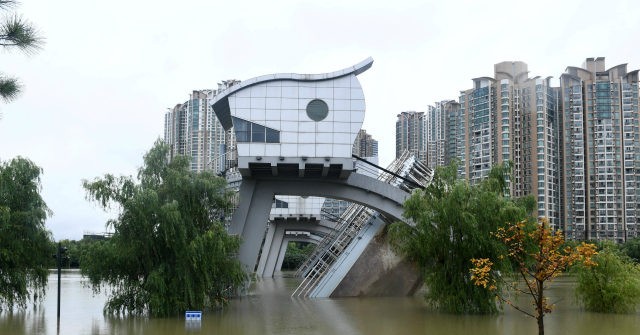
China’s official manufacturing data, released on Monday, showed a decline in manufacturing linked to widespread flooding in August.
The Chinese government insisted consumer spending is increasing, while the production decline was modest and limited to a few of the hardest-hit areas.
Barron’s pictured the August factory numbers as a minor slowdown of a recovery that began in China when harsh coronavirus quarantine measures were lifted:
China has been hit by very severe floods this summer, affecting millions of people, washing away roads and forcing the closure of some tourist sites and transport links.
The August PMI [Purchasing Managers’ Index] was also below analyst expectations reflected in a Bloomberg poll, which forecast a climb to 51.2.
Any figure above the 50-point mark represents growth rather than contraction.
In February, the index plunged to 35.7 points after the coronavirus brought much of China to a standstill.
According to official government statistics, the August PMI came in at 51.0, a decline of 0.1 from July, while the non-manufacturing PMI was up to 55.2 from 54.2 the previous month. Analysts quoted by Barron’s suggested this was partly due to families rushing out for holiday time after the coronavirus lockdowns were lifted, but spending their money inside China because international travel remains restricted.
Outside analysts may view the Chinese government numbers with some suspicion since they generally expected much more economic damage from floods in the Yangtze River area. Besides heavy manufacturing and agriculture, the flooded region also includes important fertilizer and rare-earths processing facilities.
Nikkei Asian Review reported last week that some major factories were so badly damaged by floods that insurance auditors have not even been able to estimate the damage yet. Global analysts doubted China’s reported rate of economic growth from the second quarter could be sustained, and some felt those growth figures were fueled by massive government subsidies, not genuine productivity.
Fortune suggested in early August that the Chinese government would protect its precious manufacturing assets by implementing a flood control strategy that diverted the floodwaters into farmland, setting up a potential food crisis and leaving a great many rural farmers in a very difficult position.
Radio Television Hong Kong (RTHK) reported on Monday that the stock market reflected some investor optimism:
Hong Kong stocks finished the morning on a high on Monday, extending last week’s rally following another record-breaking performance on Wall Street.
The Hang Seng Index added 1.4 percent, to 25,767.
On the mainland, the Shanghai Composite Index added 0.6 percent to 3,425, while the Shenzhen Composite Index gained 0.5 percent ,to 2,316.
RTHK said the markets in Australia, Singapore, South Korea, and Japan also rose, the latter recovering from a dip on Friday after Prime Minister Abe Shinzo’s surprise announcement of his resignation.
Business - Latest - Google News
September 01, 2020 at 03:16AM
https://ift.tt/2YVZokq
Widespread Floods Weaken Chinese Factory Activity - Breitbart
Business - Latest - Google News
https://ift.tt/2Rx7A4Y
Bagikan Berita Ini














0 Response to "Widespread Floods Weaken Chinese Factory Activity - Breitbart"
Post a Comment